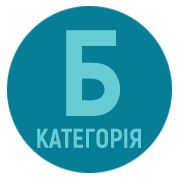ARTISTIC INTERPRETATION AS AN OBJECT OF LITERARY STUDIES: METHODOLOGICAL ASPECTS
DOI:
https://doi.org/10.32782/2307-1222.2023-55-1Keywords:
literary work, artistic interpretation, receptive aesthetics, ontological hermeneutics, philosophy of dialogue, literary criticismAbstract
The article deals with the ways of viewing artistic interpretation as an object of literary studies and describes the main vectors of substantiation of the methodological foundations of understanding this phenomenon in the context of modern humanitarian knowledge and, in particular, literary theory. The interconnections among ontological hermeneutics, the philosophy of dialogue and literary anthropology are defined as productive methodological frameworks in the study of artistic interpretation. The most promising methods of literary studies in terms of solving the afore-referenced problem include receptive aesthetics, which is genetically related to literary phenomenology, and the post-structuralist paradigm within which the concept of multiple interpretations and intermedial studies gain particular significance. The article defines the role of artistic interpretation in the structure of the existence of a literary work in the multiplicity of creation and reproduction processes (perception, understanding, interpretation). These processes, not subject to hundred-percent observation due to their numerousness and privacy, presuppose the dialogical interaction of many people who participate in a kind of cultural relay race, taking part in the preservation, renewal and reproduction of the reading and creative writing tradition. Each work of art in this coordinate system can be characterized as an artistic interpretation of the previous work, and the ideal reader is the author of an artistic interpretation, that is, a new work, which, in its turn, becomes the object of interpretation, encouraging other readers/authors to the existence/understanding in the space of interpretation and its intersubjective verification.
References
Астрахан Н.І. Буття літературного твору: Аналітичне та інтерпретаційне моделювання : монографія. Київ : Академвидав, 2014. 432 с. (Серія «Монограф»).
Бахтін М. Висловлювання як одиниця мовленнєвого спілкування. Антологія світової літературно-критичної думки ХХ ст. / за ред. М. Зубрицької. Львів : Літопис, 1996. С. 406–415.
Врубель Лукаш. Герменевтика. Література. Теорія. Методологія / пер. з польськ. С. Яковенка; упорядк. і наук. ред. Д. Уліцької. Київ : Вид. дім «Києво-Могилянська академія», 2008. С. 56–113.
Ґадамер Г.-Ґ. Герменевтика і поетика. Київ : Юніверс, 2001. 288 с.
Гайдеґґер Мартін. Дорогою до мови / пер. з нім. В. Кам’янець. Львів : Літопис, 2007. 232 с.
Герменевтика і проблеми літературознавчої інтерпретації : монографія / за ред. Р. Гром’яка. Тернопіль : Редакційно-видавничий відділ ТНПУ, 2006. 286 с.
Іванишин В.П. Нариси з теорії літератури : навчальний посібник / упоряд. тексту П.В. Іванишина. Київ : ВЦ «Академія», 2010. 256 с. (Серія «Альма матер»).
Квіт С. Виміри філософської герменевтики. Слово і час. Київ : Фенікс, 2007. № 5. С. 17–27.
Левко У.Е. Герменевтичні аспекти кіноінтерпретації художнього твору (на матеріалі екранізації художньої прози Станіслава Лема) : автореф. дис. … канд. філол. наук : 10.01.06 «Теорія літератури». Тернопіль, 2010. 20 с.
Лімборський І. Транслаторика в контексті проблем літературознавчої компаративістики: рецепція – інтерпретація – реінтерпретація. Біблія і культура. 2016. № 17. С. 79–84.
Матвійчук У. Перспективи інтерпретації літературних творів крізь призму музики. Слово і час. 2016. № 1. С. 80–86.
Рікер П. Про інтерпретацію. Після філософії: кінець чи трансформація? / упоряд. К. Байнес. Київ : Четверта хвиля, 2000. С. 312–333.
Сивокінь Г.М. У вимірах сприймання. Теоретичні проблеми художньої літератури, її історії та функцій. Київ : Фенікс, 2006. 304 с.
Фуко М. Герменевтика суб’єкта. Курс лекцій у Коллеж де Франс, 1982. Витримки. URL : http://socio.125mb.com/mishel-fukogermenevtika-subekta-22531.html (дата звернення: 17.03.2023).
Червинська О.В. Рецептивна поетика: Історико-методологічні та теоретичні засади. Чернівці : Рута, 2001. 56 с.
Barthés R. Critique et vérité. Paris : Editions du Seuil, 1966. 79 p.
Nauman M. Autor – Adressat – Leser. Weimarer Beiträge. 1971/11. S. 163–169.










